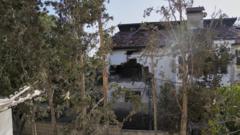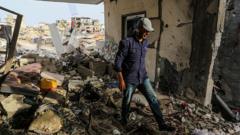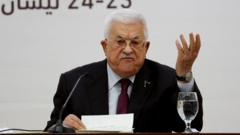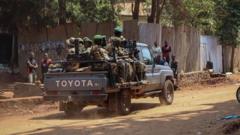As the humanitarian situation in Gaza worsens, the UN World Food Programme (WFP) has announced it has completely run out of food supplies, significantly affecting the local population amidst ongoing Israeli blockades.
UN Declares Humanitarian Crisis in Gaza as Food Aid Runs Dry

UN Declares Humanitarian Crisis in Gaza as Food Aid Runs Dry
UN World Food Programme warns of impending disaster as blockade continues
The World Food Programme (WFP) has officially reported that it has depleted all food stocks in Gaza, a situation exacerbated by Israel's strict blockade on humanitarian aid that has persisted for over seven weeks. In a recent statement, the WFP mentioned that its last remaining food supplies were delivered to hot meals kitchens on Friday, warning that these kitchens will soon run out of food.
After Israeli aid deliveries were cut off on March 2, military actions resumed following the collapse of a two-month ceasefire. Israel argues that the blockade is necessary to pressure Hamas into releasing hostages. However, the UN emphasizes that Israel has an obligation under international law to ensure the well-being of Gaza's 2.1 million residents. In contrast, Israel maintains that it is in compliance with these laws and asserts that no aid shortages exist.
The current blockade marks the longest closure Gaza has ever faced, with the effects evident in the staggering increase in food prices—up to 1,400% higher compared to the time during the ceasefire. An alarming shortage of essential commodities has raised serious nutrition concerns for vulnerable groups, including children, pregnant women, and the elderly.
Food distribution programs, which have offered critical support to the population, have only been able to meet about half of the daily nutritional needs of those in Gaza, as a significant portion of the population is left without access to basic sustenance. More than 116,000 tonnes of food—sufficient to sustain one million people for up to four months—stands ready at aid corridors, waiting for the re-opening of Gaza's border crossings.
In the face of growing criticism from international entities, including the UK, France, and Germany, which condemned the blockade as “intolerable,” Israeli officials continue to defend their actions, claiming that aid is adequate and that Hamas has compromised aid supplies for its military needs. Hamas has denied such accusations and reiterated its call for the release of hostages in exchange for an end to hostilities.
As the violence persists, the situation in Gaza continues to deteriorate, with local humanitarian organizations urging immediate action to allow aid and essential supplies to flow back into the region, stating that "the fragile gains made during the short ceasefire have unravelled" and that urgent intervention is necessary to prevent a humanitarian catastrophe.
After Israeli aid deliveries were cut off on March 2, military actions resumed following the collapse of a two-month ceasefire. Israel argues that the blockade is necessary to pressure Hamas into releasing hostages. However, the UN emphasizes that Israel has an obligation under international law to ensure the well-being of Gaza's 2.1 million residents. In contrast, Israel maintains that it is in compliance with these laws and asserts that no aid shortages exist.
The current blockade marks the longest closure Gaza has ever faced, with the effects evident in the staggering increase in food prices—up to 1,400% higher compared to the time during the ceasefire. An alarming shortage of essential commodities has raised serious nutrition concerns for vulnerable groups, including children, pregnant women, and the elderly.
Food distribution programs, which have offered critical support to the population, have only been able to meet about half of the daily nutritional needs of those in Gaza, as a significant portion of the population is left without access to basic sustenance. More than 116,000 tonnes of food—sufficient to sustain one million people for up to four months—stands ready at aid corridors, waiting for the re-opening of Gaza's border crossings.
In the face of growing criticism from international entities, including the UK, France, and Germany, which condemned the blockade as “intolerable,” Israeli officials continue to defend their actions, claiming that aid is adequate and that Hamas has compromised aid supplies for its military needs. Hamas has denied such accusations and reiterated its call for the release of hostages in exchange for an end to hostilities.
As the violence persists, the situation in Gaza continues to deteriorate, with local humanitarian organizations urging immediate action to allow aid and essential supplies to flow back into the region, stating that "the fragile gains made during the short ceasefire have unravelled" and that urgent intervention is necessary to prevent a humanitarian catastrophe.



















